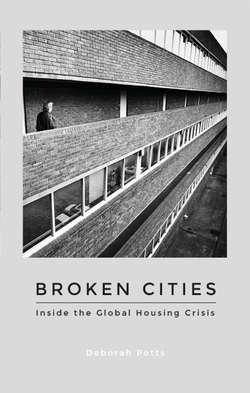Broken Cities

Реклама. ООО «ЛитРес», ИНН: 7719571260.
Оглавление
Deborah Potts. Broken Cities
Отрывок из книги
About the author
Deborah Potts is an Emeritus Reader in Human Geography at King’s College London. She has written and researched extensively on issues around urbanization, migration, livelihoods and housing, with a particular focus on urban Africa. Her previous books include African Urban Economies: Viability, Vitality or Vitiation? (2006) and Circular Migration in Zimbabwe and Contemporary Sub-Saharan Africa (2010).
.....
These sorts of conditions are quite typical of much of urban sub-Saharan Africa. Also, as the shape and scale of very large urban settlements and their economies shifted in Africa and the world entered the phase of being mainly urban, it became increasingly clear that the most pertinent insight about housing problems in African cities was not about how they differed from those elsewhere, including in wealthier societies, but about recognising the similarities. A particular issue in Africa has been the profound lack of legal, planned housing (‘formal’ housing in development-speak) that both meets some basic requirements to allow healthy living, including adequate space, and is affordable for very significant proportions of the urban population. This brings us to the second way in which working in African cities forged insights that have wider application. This is the role of what is called ‘informal housing’, which, for the moment, can be taken to mean housing that is not legal or planned according to the laws and plans of the city authorities (even if it is widely perceived to be legitimate by local societies and on such a scale that it is unlikely to be demolished). Yet again, the presence of widespread ‘informality’ in the cities of the GS is usually felt to hinder comparisons with planned and regulated cities elsewhere. In the GN, it is assumed, slums and squatter settlements are things of the past and of little relevance to contemporary urban understandings. But the point is that they did indeed exist in the past. Classroom discussions about such housing types in Africa soon lead to discussions about why slums occurred in London or New York, or squatter settlements were found around Paris, or shack settlements around Chicago. The reasons were the same – the costs of decent and/or legal housing were beyond large sections of the population: their incomes were just too low. At the time, the laws and regulations that can be used today to label contemporary urban housing ‘informal’ may either not have existed or not been enforced, but the underlying mechanisms leading to people being housed in these ways were essentially the same as they are in the cities of the contemporary GS. Thus comparing across time rather than just across space puts the role of ‘informality’ in housing outcomes into clearer perspective.
.....